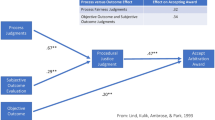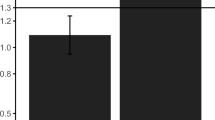Abstract
This paper focuses on the question of why fairness matters to people. Extending on terror and uncertainty management theories and the literature on the self, it is proposed here that fairness can be a means of self-defense. Thinking of a situation that is threatening to the self therefore should make fairness a more important issue to people. The findings of two experiments support this line of reasoning: Asking participants to think about things that are threatening to themselves led to stronger reactions to manipulations of both procedural and distributive fairness. In the discussion it is argued that these findings suggest that fairness especially matters to people when they are trying to deal with threats to their selves.
Similar content being viewed by others
References
Adams J. S., (1965). Inequity in social exchange. In Berkowitz L. (Eds.), Advances in Experimental Social Psychology 2 Academic Press, New York, pp. 267–299
Arndt J., Greenberg J., Solomon S., Pyszczynski T., Schimel J., (1999). Creativity and terror management: evidence that creative activity increases guilt and social projection following mortality salience J. Personality Social Psychol. 77:19–32
Austin W., McGinn N. C., Susmilch C., (1980). Internal standards revisited: effects of social comparisons and expectancies on judgments of fairness and satisfaction J. Exp. Social Psychol. 16:426–441
Austin W., Walster E., (1974). Reactions to confirmations and disconfirmations of expectancies of equity and inequity J. Personality Social Psychol. 30:208–216
Baumeister R. F. (1998). The self. In Gilbert, D., Fiske, S. T., and Lindzey, G. (eds.), Handbook of Social Psychology, Vol. 1, 4th ed. McGraw-Hill, New York, pp. 680–740
Brockner J., Heuer L., Siegel P. A., Wiesenfeld B., Martin C., Grover S., Reed T., Bjorgvinsson S., (1998). The moderating effect of self-esteem in reaction to voice: converging evidence from five studies J Personality Social Psychol. 75:394–407
Brockner J., Wiesenfeld B. M., (1996). An integrative framework for explaining reactions to decisions: interactive effects of outcomes and procedures Psychol. Bull. 120:189–208
Buunk B. P., Van Yperen N. W., (1989). Social comparison, equality, and relationship satisfaction: gender differences over a ten-year period Social Justice Res. 3:157–180
Cohen R. L., (1986). Justice: Views from the Social Sciences. Plenum, New York
De Cremer, van Knippenberg, D., van Dijke, M., and Bos, A. E. R. (2004). How self-relevant is fair treatment? Social self-esteem moderates interactional justice effects. Social Justice Res. 17(4), 407–419
Folger R., (1977). Distributive and procedural justice: combined impact of “voice” and improvement of experienced inequity J. Personality Social Psychol. 35:108–119
Folger, R. (1984). Preface. In Folger, R. (ed.), The Sense of Injustice: Social Psychological Perspectives, Plenum Press, New York, pp. ix–x.
Folger R., Cropanzano R., (1998). Organizational Justice and Human Resource Management. Sage, Thousand Oaks, CA
Folger R., Rosenfield D., Grove J., Corkran L., (1979). Effects of “voice” and peer opinions on responses to inequity J. Personality Social Psychol. 37:2253–2261
Greenberg J., Pyszczynski T., Solomon S., Rosenblatt A., Veeder M., Kirkland S., Lyon D., (1990). Evidence for terror management theory II: the effects of mortality salience on reactions to those who threaten or bolster the cultural worldview J Personality Social Psychol. 58:308–318
Greenberg J., Solomon S., Pyszczynski T., (1997). Terror management theory of self-esteem and cultural worldviews: empirical assessments and conceptual refinements. In Zanna M. (Eds.), Advances in Experimental Social Psychology.29 Academic Press, New York, pp. 61–139
Harmon-Jones E., Simon L., Greenberg J., Pyszczynski T., Solomon S., McGregor H., (1997). Terror management theory and self-esteem: evidence that increased self-esteem reduces mortality threats J Personality Social Psychol. 72:24–36
Jost J. T., Glaser J., Kruglanski A. W., Sulloway F. J., (2003). Political conservatism as motivated social cognition Psychol. Bull. 129:339–375
Koole, S. L. (2000). Positivity in Self-Evaluation. Unpublished doctoral dissertation; Nijmegen University, the Netherlands
Koper G., Van Knippenberg D., Bouhuijs F., Vermunt R., Wilke H., (1993). Procedural fairness and self-esteem Eur. J. Social Psychol. 23:313–325
Kuhl J., (2000). A functional-design approach to motivation and self-regulation: the dynamics of personality systems interactions. In Boekaerts M., Pintrich P. R., Zeidner M. (Eds) Handbook of Self-Regulation. Academic Press, San Diego, pp 111–169
Landau M. J., Johns M., Greenberg J., (2004). A function of form: terror management and structuring the social world J. Personality Social Psychol. 87:190–210
Leary M. R., Baumeister R. F., (2000). The nature and function of self-esteem: sociometer theory. In Zanna M. P. (Eds) Advances in Experimental Social Psychology 32 Academic Press, New York, pp. 1–62
Lieberman J. D., Arndt J., Personius J., (2001). Vicarious annihilation: the effect of morality salience on perceptions of hate crimes Law Human Behav. 25:547–566
Lind E. A., Tyler T. R., (1988). The Social Psychology of Procedural Justice. Plenum, New York
McGregor I., Zanna M. P., Holmes J. G., Spencer S. J., (2001). Compensatory conviction in the face of personal uncertainty: going to extremes and being oneself J. Personality Social Psychol. 80:472–488
Miedema, J., Van den Bos, K., and Vermunt, R. (2005). Exploring when people care less about fairness: the influence of ego threat on reactions to advantageous inequity (submitted)
Miedema, J., Van den Bos, K., Vermunt, R., and Zwenk, F. (2005). On the origins of why fairness matters: The self (submitted)
Mikula G., Wenzel M., (2000). Justice and social conflict Int. J. Psychol. 35:126–135
Mikulincer M., Florian V., Birnbaum G., Malishkevich S., (2002). The death-anxiety buffering function of close relationships: exploring the effects of separation reminders on death-thought accessibility Personality Social Psychol. Bull. 28:287–299
Pyszczynski T. A., Greenberg J., Solomon S., (1999). A dual-process model of defense against conscious and unconscious death-related thoughts: an extension of terror management theory Psychol. Rev. 106:835–845
Rivera A. N., Tedeschi J. T., (1976). Public versus private reactions to positive inequity J. Personality Social Psychol. 34:895–900
Rosenblatt A., Greenberg J., Solomon S., Pyszczynski T., Lyon D., (1989). Evidence for terror management theory I: the effects of mortality salience on reactions to those who violate or uphold cultural values J Personality Social Psychol. 57:681–690
Smith H. J., Tyler T. R., Huo Y. J., Ortiz D. J., Lind E. A., (1998). The self-relevant implications of the group-value model: group-membership, self-worth and treatment quality J. Exp. Psychol. 34:470–493
Solomon S., Greenberg J., Pyszczynski T., (1991). A terror management theory of social behavior: the psychological functions of self-esteem and cultural worldviews. In Berkowitz L. (Eds.), Advances in Experimental Social Psychology. 24 Academic Press, New York, pp. 93–159
Stroessner S. J., Heuer L. B., (1996). Cognitive bias in procedural justice: formation and implications of illusory correlations in perceived intergroup fairness J. Personality Social Psychol. 71:717–728
Tesser A., (2000). On the confluence of self-esteem maintenance mechanisms Personality Social Psychol. Rev. 4:290–299
Tesser A., Martin L. L., (1996). The psychology of evaluation. In Higgins E. T., Kruglanski A. W. (Eds.), Social Psychology: Handbook of Basic Principles. Guilford, London, pp. 400–432
Thibaut J., Walker L., (1975). Procedural Justice: A Psychological Analysis. Erlbaum, Hillsdale, NJ
Tyler T. R., (1990). Why Do People Obey the Law? Procedural Justice, Legitimacy, and Compliance. Yale University Press, New Haven, CT
Tyler T. R., (1997). The psychology of legitimacy: a relational perspective on voluntary deference to authorities Personality Social Psychol. Rev. 1:323–345
Tyler T. R., Smith H. J., (1998). Social justice and social movements. In Gilbert D., Fiske S. T., Lindzey G. (Eds.), Handbook of Social Psychology.4 McGraw-Hill, Boston, MA, pp. 595–629
Tyler T. R., Lind E. A., (1992). A relational model of authority in groups. In Zanna M. P. (Eds.), Advances in Experimental Social Psychology. 25 Academic Press, San Diego, CA, pp. 115–191
Van den Bos K., (1999). What are we talking about when we talk about no-voice procedures? On the psychology of the fair outcome effect J. Exp. Social Psychol. 35:560–577
Van den Bos K., (2001). Uncertainty management: the influence of uncertainty salience on reactions to perceived procedural fairness J Personality Social Psychol. 80:931–941
Van den Bos K., Lind E. A., (2002). Uncertainty management by means of fairness judgments. In Zanna M. P. (Eds.), Advances in Experimental Social Psychology. 34 Academic Press, San Diego, CA
Van den Bos K., Lind E. A., Vermunt R., Wilke H. A. M., (1997). How do I judge my outcome when I do not know the outcome of others? The psychology of the fair process effect J. Personality Social Psychol. 72:1034–1046
Van den Bos K., Miedema J., (2000). Toward understanding why fairness matters: the influence of mortality salience on reactions to procedural fairness J. Personality Social Psychol. 79:355–366
Van den Bos, K., Peters, S. L., Bobocel, D. R., and Ybema, J. F. (in press). On ethical considerations and egoism-based pleasure: reactions to advantageous inequity under cognitively busy conditions. J. Exp. Social Psychol
Van den Bos K., Poortvliet P. M., Maas M., Miedema J., Van den Ham E.-J., (2005a). An enquiry concerning the principles of cultural norms and values: the impact of uncertainty and mortality salience on reactions to violations and bolstering of cultural worldviews J. Exp. Social Psychol. 41:91–113
Van den Bos, K., Steiner, D. D., van Yperen, N. W., and Dekker, D. M. (2005b). Culture and the Psychology of Voice: The Moderating Influence of Performance Goal Orientation (submitted)
Van den Bos K., Vermunt R., Wilke H. A. M., (1996). The consistency rule and the voice effect: the influence of expectations on procedural fairness judgments and performance Eur. J. Social Psychol. 26:411–428
Van den Bos K., Wilke H. A. M., Lind E. A., Vermunt R., (1998). Evaluating outcomes by means of the fair process effect: evidence for different processes in fairness and satisfaction judgments J. Personality Social Psychol. 74:1493–1503
Vermunt R., Van Knippenberg D., Van Knippenberg B., Blaauw E. (2001). Self-esteem and outcome fairness: differential importance of procedural and outcome considerations J. Appl. Psychol. 68:621–628
Watson D., Clark L. A., Tellegen A., (1988). Development and validation of brief measures of positive and negative affect: the PANAS scales J. Personality Social Psychol. 54:1063–1070
Acknowledgments
This research was supported by the Netherlands Organization for Scientific Research (NWO), project number 400-10-030.
Author information
Authors and Affiliations
Corresponding author
Rights and permissions
About this article
Cite this article
Miedemam, J., van den Bos, K. & Vermunt, R. The Influence of Self-Threats on Fairness Judgments and Affective Measures. Soc Just Res 19, 228–253 (2006). https://doi.org/10.1007/s11211-006-0007-7
Published:
Issue Date:
DOI: https://doi.org/10.1007/s11211-006-0007-7




